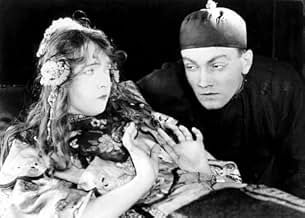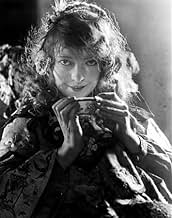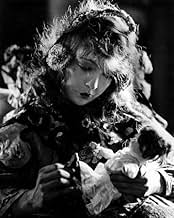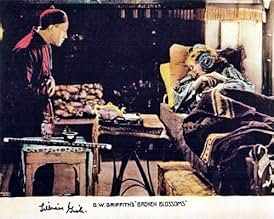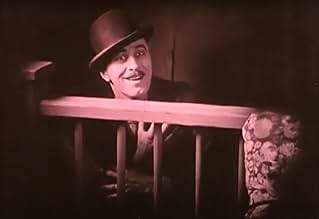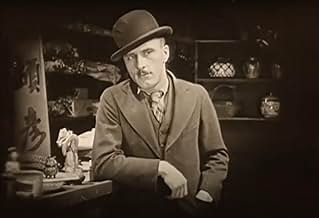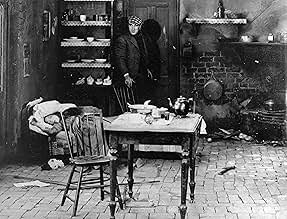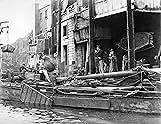CALIFICACIÓN DE IMDb
7.2/10
12 k
TU CALIFICACIÓN
Agrega una trama en tu idiomaA frail waif, abused by her brutal boxer father in London's seedy Limehouse District, is befriended by a sensitive Chinese immigrant with tragic consequences.A frail waif, abused by her brutal boxer father in London's seedy Limehouse District, is befriended by a sensitive Chinese immigrant with tragic consequences.A frail waif, abused by her brutal boxer father in London's seedy Limehouse District, is befriended by a sensitive Chinese immigrant with tragic consequences.
- Dirección
- Guionistas
- Elenco
- Premios
- 1 premio ganado en total
Lillian Gish
- Lucy - The Girl
- (as Miss Lillian Gish)
Richard Barthelmess
- Cheng Huan - The Yellow Man
- (as Mr. Richard Barthelmess)
Edward Peil Sr.
- Evil Eye
- (as Edward Peil)
Ernest Butterworth
- Secondary Role
- (sin créditos)
Frederic Hamen
- Secondary Role
- (sin créditos)
Wilbur Higby
- London Policeman
- (sin créditos)
Man-Ching Kwan
- Buddhist Monk
- (sin créditos)
Bobbie Mack
- Ringside Employee
- (sin créditos)
Moy Ming
- Minor Role
- (sin créditos)
Steve Murphy
- Fight Spectator
- (sin créditos)
George Nichols
- Police Constable
- (sin créditos)
Karla Schramm
- Burrows' Girlfriend
- (sin créditos)
Bessie Wong
- Girl in China
- (sin créditos)
- Dirección
- Guionistas
- Todo el elenco y el equipo
- Producción, taquilla y más en IMDbPro
Opiniones destacadas
The subjects this film deals with are ugly, but the whole thing is done in a beautiful way.
Subjects dealt with are racism, poverty and the reasons why.
The way Griffith deals with these subjects is the contrasts settings. Look at the room above the Chinaman's shop: opulent, festooned with the finest oriental silk. Compare that with the stark squalor of the abode of Lucy and her bruiser of a father. Then there is the education and sophistication of the orientals compared to the simplistic, ill-thought-out racial prejudice of Battling and his cronies.
I also enjoyed the boxing match. Very realistic - not the fantastic nonsense of your Rocky-type bout where a man all but beaten to a jelly suddenly pulls some heavy punches from nowhere and wins the fight.
The acting, as has been mentioned elsewhere, is terrific from all three of the principal characters. Also, their characters are well-drawn. Even Battling Burrows - complete with cauliflower ear - is more than a mere heavy: he boxes for a living, he drinks, he lives in a slum with few worldly possessions. Why?
I find it hard to believe that the films they make nowadays are nowhere near as good as this. Whatever happened to progress?
This film spawned the famous song "Limehouse Blues."
Subjects dealt with are racism, poverty and the reasons why.
The way Griffith deals with these subjects is the contrasts settings. Look at the room above the Chinaman's shop: opulent, festooned with the finest oriental silk. Compare that with the stark squalor of the abode of Lucy and her bruiser of a father. Then there is the education and sophistication of the orientals compared to the simplistic, ill-thought-out racial prejudice of Battling and his cronies.
I also enjoyed the boxing match. Very realistic - not the fantastic nonsense of your Rocky-type bout where a man all but beaten to a jelly suddenly pulls some heavy punches from nowhere and wins the fight.
The acting, as has been mentioned elsewhere, is terrific from all three of the principal characters. Also, their characters are well-drawn. Even Battling Burrows - complete with cauliflower ear - is more than a mere heavy: he boxes for a living, he drinks, he lives in a slum with few worldly possessions. Why?
I find it hard to believe that the films they make nowadays are nowhere near as good as this. Whatever happened to progress?
This film spawned the famous song "Limehouse Blues."
D.W.Griffith returns for another one and it would appear that he was still fighting with the demons left over from A Birth of a Nation (1915). He again tried to deal with the fires of racism, but this time with a love story and another appearance by Lillian Gish, in Broken Blossoms (1919). This film's title is actually "Broken Blossoms or the Yellow Man and the Girl". "Yellow Man" refers to the Asian man, Cheng Huan, who falls in love with Gish's Lucy. Right off the bat we get exposed to old time racist terms. The "C" word makes an appearance too. But, Griffith does use this film as a tool to teach a lesson to those who are evil or just plain bad.
It covers a lot of domestic/controversial issues, such as, interracial relationships, child abuse, racism and bullying. It is a hope that this film was the first stepping stone to finding tolerance in the world. It also is a telling lesson about, no matter how civilized you are, you can still do a lot of wrong. Huan (Barthelmess), leaves his homeland to go to England to spread the wisdom of the Buddha to the West and the Anglo-Saxons. It is the biggest mistake he would make in his life. It is a telling story about how the good guy finishes last. The man who comes to the civilized world to try and help make those people better, finds out that he is in the wrong place at the wrong time and nothing but torment befalls him.
Huan assigns himself the job to look after a young woman (Gish), who is terrorized and beaten by her boxer father (Crisp), on a daily basis. Huan has to deal with snitches and liars who align themselves with the evil boxer and in the end finds himself falling into the same dark abyss that he tried to teach others to stay away from. This is an amazing story and has been told many times since, but being that this is a pioneering effort, makes it all the more powerful. True, there are parts that are slow and even boring, but it is that tense situation that starts to build and build until the terrifying and sad end.
8.1 (B MyGrade) = 8 IMDB
It covers a lot of domestic/controversial issues, such as, interracial relationships, child abuse, racism and bullying. It is a hope that this film was the first stepping stone to finding tolerance in the world. It also is a telling lesson about, no matter how civilized you are, you can still do a lot of wrong. Huan (Barthelmess), leaves his homeland to go to England to spread the wisdom of the Buddha to the West and the Anglo-Saxons. It is the biggest mistake he would make in his life. It is a telling story about how the good guy finishes last. The man who comes to the civilized world to try and help make those people better, finds out that he is in the wrong place at the wrong time and nothing but torment befalls him.
Huan assigns himself the job to look after a young woman (Gish), who is terrorized and beaten by her boxer father (Crisp), on a daily basis. Huan has to deal with snitches and liars who align themselves with the evil boxer and in the end finds himself falling into the same dark abyss that he tried to teach others to stay away from. This is an amazing story and has been told many times since, but being that this is a pioneering effort, makes it all the more powerful. True, there are parts that are slow and even boring, but it is that tense situation that starts to build and build until the terrifying and sad end.
8.1 (B MyGrade) = 8 IMDB
10drpax
"In this scarlet house of sin, does he ever hear the temple bells?" Broken Blossoms is the movie I use to introduce people to silent film who only know it from Chaplin shorts or Birth of a Nation. It is one of the most sensitive movies ever made, in my opinion, and is usually overlooked in any top 100 movie listing. I fear the oversight is due to the listers not having actually seen it.
The version I have--which is now sadly out of print--is the Thames Video version with Lillian Gish's introduction. It is also the one with the original Louis Gotshalk score, pieces of which are sometimes heard on other versions, but the impact of the full orchestral Gotshalk score is overwhelming on an already exquisite film. If you have a chance to see this version, by all means do so.
In answer to a question in another posting, the movie WAS originally tinted--it was part of the "epic poetry" attempt and was quite common with a lot of Griffith work--even back to "A Corner in Wheat".
While I am an immense Gish fan, a lot has already been said about Miss Lillian in the other comments, so I will concentrate on Dick Bartlemess as Chen Huan. The quote above accompanied by his sad look as he leans against the wall of his curio shop tell it all: wrecked youthful enthusiasm--his despair only temporarily abated by the "pipe" in the Limehouse opium dens. His dreams of youth, all packed away in his garret, are only brought out when the one thing that gives him hope that is goodness amidst all the squalor stumbles into his shop.
Only after Lucy arrives can Chen Huan allow himself to dream--to return to golden days of learning, beauty and goodness and ideals. He literally places his dreams of his lost youth on the trembling body of Lucy, but it such a pristine ideal he dare not "defame" it, or it too will disappear like all his other dreams. He must observe it from afar--almost ephemeral. He knows what Hell is like (even before he was shown the booklet by the Christian Brothers). His hell is his lost heart, his lost love. "Bits and pieces of his shattered life." Almost invariably when I find someone to share the movie with me, they are amazed how well it is made and how well it's core story stands up to today. The particulars of Chinese, Cockney and London are not the point; it is a story of hope and despair, of lovers and dreamers. A mature story for a mature audience.
I often wonder if it could be made today. As open as we think we are, I wonder if the basic story could be told again. No matter--it's been told--excellently
The version I have--which is now sadly out of print--is the Thames Video version with Lillian Gish's introduction. It is also the one with the original Louis Gotshalk score, pieces of which are sometimes heard on other versions, but the impact of the full orchestral Gotshalk score is overwhelming on an already exquisite film. If you have a chance to see this version, by all means do so.
In answer to a question in another posting, the movie WAS originally tinted--it was part of the "epic poetry" attempt and was quite common with a lot of Griffith work--even back to "A Corner in Wheat".
While I am an immense Gish fan, a lot has already been said about Miss Lillian in the other comments, so I will concentrate on Dick Bartlemess as Chen Huan. The quote above accompanied by his sad look as he leans against the wall of his curio shop tell it all: wrecked youthful enthusiasm--his despair only temporarily abated by the "pipe" in the Limehouse opium dens. His dreams of youth, all packed away in his garret, are only brought out when the one thing that gives him hope that is goodness amidst all the squalor stumbles into his shop.
Only after Lucy arrives can Chen Huan allow himself to dream--to return to golden days of learning, beauty and goodness and ideals. He literally places his dreams of his lost youth on the trembling body of Lucy, but it such a pristine ideal he dare not "defame" it, or it too will disappear like all his other dreams. He must observe it from afar--almost ephemeral. He knows what Hell is like (even before he was shown the booklet by the Christian Brothers). His hell is his lost heart, his lost love. "Bits and pieces of his shattered life." Almost invariably when I find someone to share the movie with me, they are amazed how well it is made and how well it's core story stands up to today. The particulars of Chinese, Cockney and London are not the point; it is a story of hope and despair, of lovers and dreamers. A mature story for a mature audience.
I often wonder if it could be made today. As open as we think we are, I wonder if the basic story could be told again. No matter--it's been told--excellently
Turning away from the epic scale of his quintessential movies, Birth of a Nation and Intolerance, director D. W. Griffith turned to an altogether smaller and more intimate story in 1919. Instead of telling a vast tale spanning millennia and featuring a cast of thousands, he focused his attention on the tragic interplay between just three people: a Chinese immigrant to London (Richard Barthelmess), a young waif with whom he develops a brief but touching relationship (Lillian Gish), and her brutish father (Donald Crisp). It's been suggested this was another sop by Griffith to those who had accused him of being a racist due to the content of BoaN although, while Bathelmess' Chinese immigrant is a completely sympathetic character, the thoughtless racist attitudes that were commonplace back then are still very much in evidence. For example, the movie's secondary title is 'The Yellow Man and the Girl', and during a tender love scene, Gish's Lucy says to him: "Why are you so good to me, Chinky?" which tends to break the mood just a tad.
Griffith's trademark use of tiny gestures and changes of expression is very much in evidence in the performances of Barthelmess and Gish, while Crisp, who is barely recognisable as the kindly patriarch of countless 40s flicks, paints a broader picture of the loutish Battling Burrows. This counterpoint between screen father and daughter works well, stressing the fragile nature of Gish's waif, while emphasising the misery of her dependence upon her uncouth father. Barthelmess, meanwhile spends much of his time gazing miserably at the bleakness of the world around him as his character tries to lose himself in a haze of opium after failing to spread the word of peace. Chen seems to be moving through a dream for much of the film, passively allowing himself to be buffered by the world, and only shaking himself from his torpor when Lucy almost literally falls at his feet. This scene, in which Lucy and Chen first meet, is wonderfully atmospheric and beautifully framed and is, strangely, the prelude to the film's weakest segment. Having set the scene beautifully and created a great atmosphere, Griffith allows proceedings to slip into melodrama. While Battling's discovery of Lucy's new friendship is melodrama of the most Victorian kind, the relationship between the two potential lovers goes nowhere which, while perhaps true to the film's title, leaves the story struggling for momentum. Lucy enjoys a few hours of being spoiled by Chen the first time in her life that she ever has been, but there is very little interaction between them, and Chen's apparent consideration of forcing himself on Lucy before finally kissing her sleeve really doesn't ring true at all. In fact, the scene looks as if it were added almost as an afterthought to inject a little suspense.
Nevertheless, BROKEN BLOSSOMS is another example of one of the world's greatest directors operating at somewhere close to the top of his game. In another few years, Griffith's Victorian viewpoint would look horribly outdated to the Roaring Twenties crowd. There were still more classics to come, but in terms of technical and creative accomplishment he had already peaked.
Griffith's trademark use of tiny gestures and changes of expression is very much in evidence in the performances of Barthelmess and Gish, while Crisp, who is barely recognisable as the kindly patriarch of countless 40s flicks, paints a broader picture of the loutish Battling Burrows. This counterpoint between screen father and daughter works well, stressing the fragile nature of Gish's waif, while emphasising the misery of her dependence upon her uncouth father. Barthelmess, meanwhile spends much of his time gazing miserably at the bleakness of the world around him as his character tries to lose himself in a haze of opium after failing to spread the word of peace. Chen seems to be moving through a dream for much of the film, passively allowing himself to be buffered by the world, and only shaking himself from his torpor when Lucy almost literally falls at his feet. This scene, in which Lucy and Chen first meet, is wonderfully atmospheric and beautifully framed and is, strangely, the prelude to the film's weakest segment. Having set the scene beautifully and created a great atmosphere, Griffith allows proceedings to slip into melodrama. While Battling's discovery of Lucy's new friendship is melodrama of the most Victorian kind, the relationship between the two potential lovers goes nowhere which, while perhaps true to the film's title, leaves the story struggling for momentum. Lucy enjoys a few hours of being spoiled by Chen the first time in her life that she ever has been, but there is very little interaction between them, and Chen's apparent consideration of forcing himself on Lucy before finally kissing her sleeve really doesn't ring true at all. In fact, the scene looks as if it were added almost as an afterthought to inject a little suspense.
Nevertheless, BROKEN BLOSSOMS is another example of one of the world's greatest directors operating at somewhere close to the top of his game. In another few years, Griffith's Victorian viewpoint would look horribly outdated to the Roaring Twenties crowd. There were still more classics to come, but in terms of technical and creative accomplishment he had already peaked.
Many people believe the best Griffith film is "Intolerance"; some stand by "Way Down East" and still others believe in "Birth of a Nation" despite all its problems. However, I think "Broken Blossoms" is the Griffith film which stands the test of time and still rings true today, over 83 years from its debut.
"Broken Blossoms" is the story of two wounded, abused, seemingly hopeless individuals who find comfort and strength in one another. The Chinaman (played by Richard Barthelmess) and little Lucy Burrows (played by Lillian Gish) are as different as night is to day, however they complement each other and give each other what the other needs; Lucy gives the Chinaman respect as a human being, he in turn gives Lucy affection and love.
What happens to the two souls is, in my opinion, one of the most heartbreaking turn of events ever filmed. The brutal treatment of Lucy by her father and the ultimate sadness of the Chinaman at the end of the film always reduce me to tears.
Those who believe that silent movies are inferior to today's craft really needs to see "Broken Blossoms" and open their hearts and minds to a world that is beyond beauty and beyond pain.
"Broken Blossoms" is the story of two wounded, abused, seemingly hopeless individuals who find comfort and strength in one another. The Chinaman (played by Richard Barthelmess) and little Lucy Burrows (played by Lillian Gish) are as different as night is to day, however they complement each other and give each other what the other needs; Lucy gives the Chinaman respect as a human being, he in turn gives Lucy affection and love.
What happens to the two souls is, in my opinion, one of the most heartbreaking turn of events ever filmed. The brutal treatment of Lucy by her father and the ultimate sadness of the Chinaman at the end of the film always reduce me to tears.
Those who believe that silent movies are inferior to today's craft really needs to see "Broken Blossoms" and open their hearts and minds to a world that is beyond beauty and beyond pain.
¿Sabías que…?
- TriviaThe film was produced by D.W. Griffith for Adolph Zukor's Artcraft company, a subsidiary of Paramount Pictures. However, when Griffith delivered the final print of the film to Zukor, the producer was outraged. "How dare you deliver such a terrible film to me!" Zukor raged. "Everybody in the picture dies!" Infuriated, Griffith left Zukor's office and returned the next day with $250,000 in cash, which he threw on Zukor's desk. "Here," Griffith shouted, "If you don't want the picture, I'll buy it back from you." Zukor accepted the offer, thus making this the first film released by United Artists, the production company formed in 1919 by Mary Pickford, Charles Chaplin, Douglas Fairbanks, and Griffith. It was a remarkably successful film, both critically and at the box office.
- ErroresThe intertitles state, "The Buddha says, 'What thou dost not want others to do thee, do thou not to others.'" It was actually not the Buddha but Confucius' teaching.
- Citas
Lucy Burrows: Don't do it, Daddy! You'll hit me once too often - and then they'll - they'll hang yer!
- ConexionesFeatured in The Philco Television Playhouse: The Birth of the Movies (1951)
Selecciones populares
Inicia sesión para calificar y agrega a la lista de videos para obtener recomendaciones personalizadas
- How long is Broken Blossoms?Con tecnología de Alexa
Detalles
- Fecha de lanzamiento
- País de origen
- Idioma
- También se conoce como
- Broken Blossoms
- Locaciones de filmación
- Productora
- Ver más créditos de la compañía en IMDbPro
Taquilla
- Presupuesto
- USD 88,000 (estimado)
- Tiempo de ejecución1 hora 30 minutos
- Mezcla de sonido
- Relación de aspecto
- 1.33 : 1
Contribuir a esta página
Sugiere una edición o agrega el contenido que falta

Principales brechas de datos
By what name was Broken Blossoms or The Yellow Man and the Girl (1919) officially released in Canada in English?
Responda
